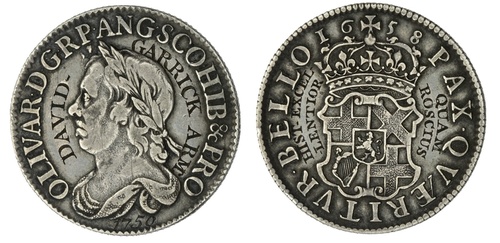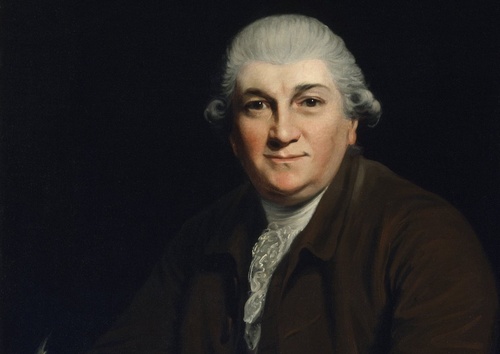Auction: 22007 - British and World Coins and Commemorative Medals Autumn Auction
Lot: 538
"The deaf hear him in his action, and the blind see him in his voice" |
Oliver Cromwell, Shilling, 1658, laureate and draped bust left, neatly engraven: DAVID. | GARRICK ARM. in fields, 1750 below truncation, rev. crowned shield, neatly engraven: HIST. EXCEL-LENTIOR QUAM ROSCIUS in fields, straight milled edge, 5.91g, 6h (ESC 1005; Bull 254; Spink 3228), the host coin evenly circulated and richly cabinet toned, strictly a bolder fine, the engraving exceptionally neat and added with the utmost care, unsurprising given its clear allusion to the famous 18th Century Thespian and manager of the Theatre Royal, Drury Lane, a most fascinating curiosity on an already prohibitively scarce numismatic object, almost certainly presented to Garrick himself in the aftermath of his 'Thespian spectacular' production of Romeo and Juliet, UNIQUE and of theatrical, numismatic and Shakespearian interest
Believed to be:, The Effects of the Late David Garrick Esq., Christie's, 5 May 1825
This quite remarkable para-numismatic object is as extraordinary in its choice of host, as it is in its veneration. Not only has a Cromwellian Shilling been repurposed, an almost unprecedented act of idle vandalism to so rare and prized a coin, but its dedication is equally powerful and enlightening in its message:
"DAVID GARRICK ARM. 1750 /// HIST[RIO]. EXCELLENTIOR QUAM ROSCIUS"
"David Garrick, Armiger, 1750, an actor more excellent than Roscius"
The mystery of this quote is only fully understood when it is considered in juxtaposition to the deliberate use of Cromwell's portrait. As the only uncrowned ruler in centuries of English kingship, the Protector's effigy adorned by laurel wreath and drapery is an evident import of imagery and idea of rule from the age of Rome. Like Caesar became the sobriquet for leadership, Quintus Roscius Gallus (died 62 BC) became a byword for histrionic exceptionalism. Cromwell and the effigy are both decidedly Roman, the contemporary figure of Roscius our gateway to Garrick.
1750 would be a year of particular significance for Garrick. Having recently been appointed manager of the Theatre Royal, Drury Lane, he would schedule his second revised production of Romeo and Juliet in this year which he would play the fabled lead. Despite the 1748 showing being perhaps his better performance, it would be the latter production that would meet the most critical acclaim and evidently earn him the praise of his contemporaries, and the sobriquet the 'English Roscius' for which this coin was apparently presented him.
Following his death in 1779, his collection of paintings, numismatic medals, watches and Shakespeariana were passed to his nephew. In the 1820s, the family fell upon hard times, and two sales of his effects were arranged by Messrs. Christie in June 1823 and May 1825. The first sale of his 71 paintings included the following listing:
"Another picture by Hogarth, the subject of which was Garrick seated at a table, composing his Prologue to Taste, and Mrs Garrick behind, interrupting him. This sold at the very low price of 70 guineas. It is in every respect a very clever picture. In the portrait of Garrick in this picture, as well as in others by Reynolds, Zoffany &c., one cannot avoid being struck by the extreme vivacity of the expression and moveability of feature which characterize the head of the Roscius."
The second sale offered such effects as:
'nine copper medals of Shakespeare, Garrick, Martin Folke &c and six Seals - 10 guineas
and: 'Medals of Pope Clement XI, Charles II., Coronation, ditto., the Pretender, Leopold and Henry of Austria, and of Garrick - 3 guineas
and finally: '...a silver medal of Garrick, and one of Madeleine Clairon...-£7.5s.
From these descriptions it is evident that Garrick himself enjoyed many personalised gifts of coins, medals and paintings bearing his likeness, the latter description undoubtedly referring to Lewis Pingo's 1772 Rendition of his effigy, bearing the motto: 'He United All Your Powers' (Eimer 746, BHM 160). However our smoking gun is the list of attendees to the sale which included famous numismatist William Webster. The brief allusion to medals of 'The Pretender' are particularly crucial. Not only was it the habit of the day to refer to coins as medals almost interchangeably, but here we have conclusive proof of Garrick's ownership of medals of Oliver Cromwell, it is no quantum leap to consider that this lot description contains the very object offered here today.
Subject to 20% VAT on Buyer’s Premium. For more information please view Terms and Conditions for Buyers.
Sold for
£2,300
Starting price
£1000







